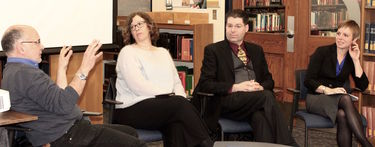Mellon Fellow Lindy Brady Presents Her Work at the Annual Mellon Colloquium

Since 2001, through the generous response of the Andrew W. Mellon Foundation to a challenge grant awarded to Notre Dame by the National Endowment for the Humanities, the Medieval Institute has offered an A.W. Mellon Postdoctoral Fellowship in Medieval Studies to an outstanding young scholar to do research while in residence for the year at Notre Dame. This Fellowship is designed for junior faculty who currently hold a position in a United States university as an assistant professor and enables its holders to complete research and writing on a book manuscript in advance of tenure.
The 2015-16 Fellow is Professor Lindy Brady of the University of Mississippi. In January she presented her book manuscript in progress, "Writing the Welsh Frontier in Anglo-Saxon England," at the annual Mellon Colloquium. Three invited senior scholars, Elaine Treharne (Stanford), Paul Russell (Cambridge), and Andrew Rabin (Louisville), responded. Following the public portion of the Colloquium, Treharne, Russell, and Rabin met with Brady in an extended collegial session to discuss her manuscript.
Of the experience Brady writes, "I don’t think I can adequately express what an amazingly generous gift the A. W. Mellon Junior Faculty Fellowship in Medieval Studies is or what a difference it will make for the rest of my career. I am so grateful to Notre Dame and to the Medieval Institute on behalf of all young medievalists whose home universities don’t give pre-tenure leave for being generous enough to ensure that an opportunity like this exists — it’s an incredible gift from Notre Dame to the medieval community at large in the research and writing time alone. The fellowship itself has been a fantastic experience, and I feel so lucky to have had the opportunity to finish writing my book in the MI’s spectacular library and with the support of its warm and welcoming community of scholars. But probably even more important to me than the time off to write was the Mellon colloquium itself. As I told my three readers afterwards, the weekend of the colloquium was one of the most productive and meaningful intellectual experiences I've ever been a part of. I feel so grateful and unbelievably lucky to have had my work taken so seriously by three wonderful senior scholars who I have looked up to so much throughout my career. The Mellon colloquium not only made a world of difference in my current book project, it was also a model of the ways I want to work, think, and collaborate within my field from here on out. I am also grateful for the MI’s flexibility in allowing me to schedule the colloquium in January, so that I could use the second half of the fellowship to revise my book manuscript based on my readers’ suggestions. This fellowship has been so much more meaningful and productive than I ever could have imagined, and I am so grateful to Notre Dame and to the MI for this opportunity."
Read more about our past Mellon Fellows and their projects.